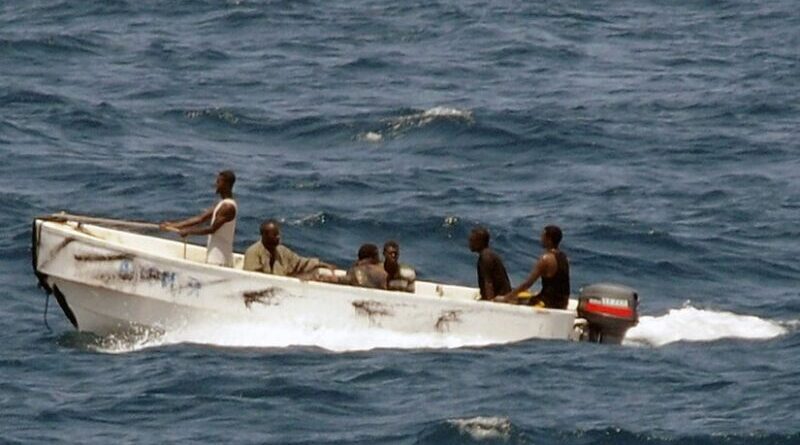On Piracy And Pigeonholed Security – OpEd
By Abukar Arman
A few years back, the image of the Somali pirates—locally as well as internationally—was one painted by some with a heroic narrative; an image of underdog villagers fighting for their survival and for the protection of their internationally recognized territorial waters.
Today, these pirates are considered as an international menace and a serious security threat in the high seas. And, ironically, dealing with this threat might require something much simpler than the current costly cubicle approach.
In 2005, these pirates were small sea-side village fishermen whose livelihoods were severely damaged by illegal over-fishing and toxic waste dumping. They were the provoked fishermen who chased off the perpetrators.
As a nation without a central government with broad authority, Somalia has arguably been the worst victim of over-fishing; and these pirates essentially became a volunteer coast guard providing services that the defunct Somali navy could not deliver.
International maritime marauders have been exploiting the Somali waters with impunity. They commission giant fishing vessels equipped with fish processing and packing, huge freezing capacity, and a fishing apparatus capable of sweeping massive schools of fish along with coral reefs, thus destroying what’s known as the rainforests of the sea as they sustain sea life.
Meanwhile, marine ecologists and international environmental organizations such as Greenpeace continue to sound the alarm bells that over-fishing and the dumping of industrial toxic waste are the biggest threats facing the marine ecosystems today as they can dangerously deplete sea life in that part of the world.
Indeed, the situation is very serious. A few years ago, the United Nations Environment Program spokesman, Nick Nuttall, “There’s uranium radioactive waste, there’s leads, there’s heavy metals like cadmium and mercury, there’s industrial wastes, and there’s hospital wastes, chemical wastes…”
Today, while the over-fishing and illegal chemical dumping phenomena have not changed, the pirates have. Like the engines driving the phenomena, the pirates too are motivated by illegal profits. They are now willing to do whatever necessary to achieve their objectives and care less about the economic, security, political, and social consequences of their actions. The tragic killing of four Americans who were taken hostage aboard the yacht Quest off the coast of Oman is one daunting example.
Piracy has become a booming business and an industry of $12 billion according to some estimates. This includes costs associated with ransom, insurance, escorting, negotiating, consulting, ransom delivery, vessel security modernization, etc.
According to International Maritime Bureau Piracy Reporting Center and the Lloyds List, currently Somali pirates are holding 25 vessels owned by different countries, and 800 crewmembers of various nationalities as hostages.
Everyone seems to agree—at least in theory—that piracy in Somalia is a symptom of the protracted political condition of that country; and that solving the piracy issue would require establishing rule of law in the ungoverned areas where piracy is commonly launched from. However, when it comes to assisting the Somali government to expand its reach and to build a cost guard force able to protect its waters, lip-service is all that is often offered.
Instead of spearheading the establishment of maritime regimes banning over-fishing and the dumping of chemical waste and imposing hefty fines on perpetrators (and perhaps set up a fund to help this abused nation), the UN opted to follow an ill-conceived, but broadly applied, policy of funding counter-piracy and counter-terrorism in Somalia along the political division lines.
A new UN funded prison has recently opened in “Somaliland” to incarcerate convicted pirates. Immediately, authorities in that region asserted that it would not deal with any pirates from other regions or the rest of Somalia. Never mind that most of these pirates operate out of the neighboring region of “Puntland”. This decision, needless to say, underscores the importance of having an authority that transcends clan sensitivities and demarcations; it equally underscores the urgency of a holistic Somali reconciliation that includes Somaliland.
Like violent extremism, piracy is a Somali national security issue; and our collective security is indeed interdependent. Effective security requires effective collaboration and cooperation. It is not farfetched to predict that as soon al-Shabaab is pushed out of Mogadishu, they would be setting new shops where they are guaranteed some clan support; in regions where individuals in its top leadership hail from.
It is time to consider bolstering the Somali cost guard and enhancing the judicial capacity of the government to prosecute any pirates caught in its waters, and imprison those found guilty regardless of what region or country they are from.
The current Somali government is determined to take that holistic approach toward security. Pigeonholing security might be good a tactic, but never a good strategy.
Abukar Arman is Somalia’s Special Envoy to the United States.

